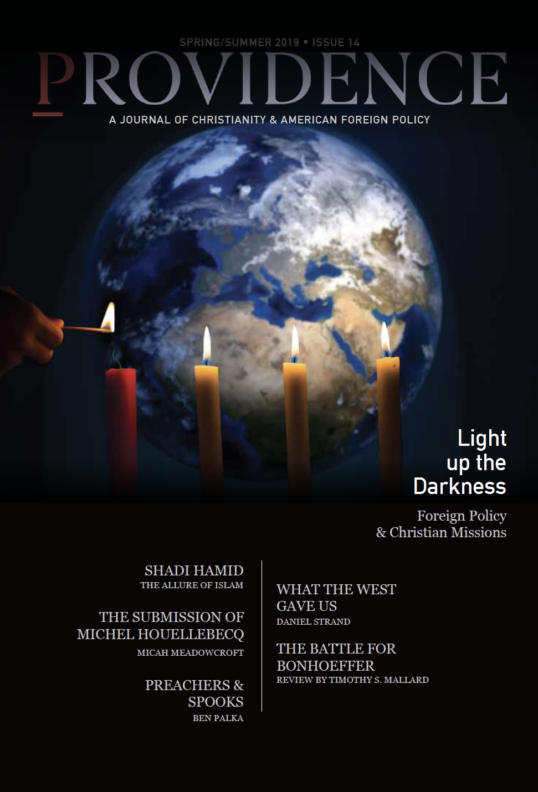The theme of the latest print issue of Providence is the sometimes conflicted and often contentious relationship between Christian missions and US foreign policy. There are few arenas of public engagement where the precepts of Christian theology and the politics of American statecraft come in such proximity to one another. This interaction is unavoidable, and missionaries and international relations practitioners would do well to understand its origins and effects.
The Gospel writers Luke and Matthew both recorded the closing admonitions of Jesus to his followers, and Jesus was explicit in his terminology and specific in his scope:
Go therefore and make disciples of all nations. (Matthew 28:19)
You will receive power when the Holy Spirit has come upon you, and you will be my witnesses in Jerusalem and in all Judea and Samaria, and to the end of the earth. (Acts 1:8)
The political ramifications of this command should be immediately apparent. Christianity was never meant to be a local phenomenon; it was destined to be a global and universal movement. Jesus’ language was explicit in addressing the task at hand for all of his followers and their posterity, just as he was specific as to where that task was to be carried out. His followers were to “go make disciples,” and this discipleship was to occur amidst “all the nations.” Jesus mentions specific cities and bounded regions, and then applies his mission to the entire globe. The final words of Jesus to his disciples on earth were the first words of the coming Christian millennia that would proliferate first in Jerusalem, then in Judea and Samaria, and then to the far corners of the earth.
The relationship between Christ’s otherworldly ethic and his worldly presence was meant to serve as foreshadowing and a model to his followers of the tension they would likely experience as “little Christs” or “Christians.” From the outset of the Christian movement, this tension was cultural, political, and at times fatal. There has never been a period, in all of Christian history, when the mission to proclaim the “good news” or Gospel of Jesus was not an illegal endeavor somewhere. And even when and where it was legal, it was rarely culturally palatable. Despite these prohibitions and hinderances, the Christian Gospel and the resulting culture that flows from the belief in that Gospel advanced and continues to advance.
Christianity was never meant to be a local phenomenon; it was destined to be a global and universal movement.
There have been periods when missionaries operated outside the purview and without the support of their native governments, and when they operated as agents of the state. There were times when missionaries were powerless and persecuted, preaching to a hostile community; a few times they were part of empowered minorities who persecuted others. The history of Christian missions is just as messy and controversial as the periods of history in which those missions took place.
America was in no small part shaped by Christian missions. Early states were populated by Christian missionaries; the American government was constructed to accommodate their presence, and those legal accommodations made America an unparalleled platform for global Christian evangelism. Furthermore, it is undeniable that Christian missions and missionaries had an impact on American foreign policy. Motivated by their desire to bring good news to the nations, Christians send missionaries to engage peoples in global megacities and remote villages, in countries both allied with and antagonistic toward the US. They influenced foreign cultures for the Gospel, and as a result they influenced American perceptions of foreign cultures. Their presence and mission create a tension as old as the Gospels they preach; they render under caesar that which is caesar’s and unto to God’s that which is God’s. This dual-loyalty may be eternally significant, but it can lead to contemporary political difficulty. The impact of American missionaries on American foreign policy is three-fold: it can be applied outward to other nations, inward to our own, and upward into the official foreign relations apparatus.
Outward: Missionaries Impact a Foreign Cultures Perception of America
Beyond the halls of power and influence, far from foreign capitals and megacities, missionaries frequently go where diplomats fear to tread. In small villages and remote hamlets, missionaries spread the message of Christianity, and where they go, it is unavoidable that the American culture that sent them is along for the ride. While at times this can be a hindrance to the mission, it is also an opportunity. While religious missionaries’ chief concern should be their religious obligation, they would do well to appreciate that, whether they like it or not, they will likely be the only American whom their hosts will ever meet.
In 2013, I took part in a small scouting trip to northeast India in conjunction with a large American-based missions organization. Bihar, a state the size of Indiana but with a population of 100 million, was one of the poorest and least developed states in India. Out of the 100 million people who call that remote and crowded place home, I was one of only a handful of Americans present in the state, according to our embassy. Few missionaries traveled there, and fewer still stayed for very long. Those missionaries present in the region were surreptitious and under the radar to avoid political retribution and possible deportation. Regardless of the setbacks, there was work being done to provide water and infrastructure to a community in dire need of both. And while our presence was often met with skepticism and suspicion, we were just as frequently greeted warmly as “the Americans.” For all the sturm and drang caused by those critical of Christian cross-cultural exchanges and “Western” pollution of innocent foreign cultures, these exchanges are often invaluable to American interests abroad. Every well dug, every orphanage opened, every hospital dedicated, and every other kind gesture in a hostile world serves to erode the perception of American arrogance and indifference.
Inward: Missionaries Affect American Culture’s Perception of the World
Despite the common perception that the United States had an isolationist beginning, from its inception America has been involved in the global community. By 1801, a mere 12 years after the US Constitution came into force in 1789, the US enjoined Sweden in its war on the Barbary Coast and sent the Marines to Tripoli. We had ambassadors in foreign capitals before we had administrators in our own. That being said, individual Americans, by and large, have endeavored to keep to themselves. The building and expansion of our own country have often crowded out the American public’s interest in other countries. And even though the burden of global leadership has grown, American communities are often blissfully ignorant of the globe their country is leading.
Coastal elites often blame rural communities and the “fly-over country” for America’s ignorance and indifference toward the world, but few appreciate missionaries’ role in dispelling this ignorance. The heart of America’s Christian community exists in these very places, for it is here you find churches. And missionaries are being sent from and returning to those churches. America’s largest global mission organization, the International Mission Board of the Southern Baptist Convention, is located not in New York or LA, but Richmond, Virginia. Organizations like the IMB, and countless independent missions and churches, mobilize tens of thousands of American missionaries to nearly every country on the globe. And from time to time, those missionaries return and report their experiences to their supporters and organizations. This is an invaluable line of cultural exposure to a region incorrectly decried as culturally indifferent. There are citizens from small towns in Mississippi and Alabama living in Mozambique and Albania. Churches in Georgia and Florida are building orphanages in Zimbabwe and South Africa. Community ministries in Arkansas are providing micro-loans for small businesses in Indonesia and Vietnam.
One would be foolish to doubt the impact these missions and missionaries have on their communities of origin. Aside from the obvious cultural exposure, these missionaries’ presence in foreign contexts can have real political implications here at home. One needs to look no further than the case of Pastor Andrew Brunson. Originally from North Carolina, Brunson lived in Turkey for 23 years, pastoring a church in Izmir, Turkey’s third-most populace city. While applying for permanent residence in Turkey in 2016, he was accused of taking part in the failed coup attempt against Turkey’s illiberal President Recep Tayyip Erdoğan. Brunson was held and unlawfully imprisoned for over a year. America’s religious and evangelical communities responded swiftly to Brunson’s detention and instigated petitions, prayer drives, and actively lobbied the Trump administration to advocate for the pastor’s release. The Trump administration, which came to power in large measure due to evangelical support, applied significant diplomatic and economic pressure on the Erdoğan regime, ultimately securing Brunson’s freedom. In this specific episode, one can see how the experience of a North Carolina missionary informed and mobilized a large segment of the US population to influence policy.
Upward: Missionaries Affect the Foreign Relations Establishment
Finally, many of these missionaries return from abroad and channel their passion for international engagement to the public realm of international relations. They get elected to the White House (Jimmy Carter) and Congress (Tim Kaine, Mitt Romney, James Lankford, et al.); they become governors (Bill Ritter of Colorado); they work at the State Department, United Nations, and nongovernmental organizations. Informed by their international experiences on the mission field, these men and women shape foreign policy and international relations. They provide insight, experience, and empathy to a field often bereft of all three.
History is replete of examples of what occurs when these realities are ignored, when countries and international relations professionals treat religious belief as a mere aesthetic interest.
Providence exists in part to equip the American mind to engage the real world, and to expose both the private and public sectors to the essential religious realities which underline and inform international relations and American foreign policy. History is replete of examples of what occurs when these realities are ignored, when countries and international relations professionals treat religious belief as a mere aesthetic interest. Missionaries are embodied reminders of the power of these beliefs and the impact religion can have on persons and policy. The mission they undertake will not end, until The End. So whether a Christian is a minister in a pulpit or a minister in parliament, he or she would do well to understand Christian missions’ impact.








 Sponsor a student for Christianity & National Security 2024
Sponsor a student for Christianity & National Security 2024